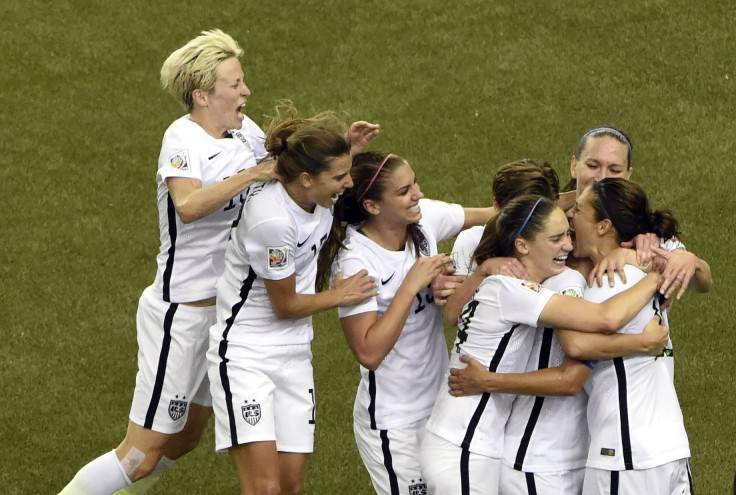US Women's Soccer 2015: Americans Await Final Opponent For World Cup Championship

For the second successive tournament, the United States women’s soccer team will contest the World Cup final, but it remains to be seen whether it will be a chance for revenge for its agonizing 2011 loss, or a meeting with a first-time finalist.
After underwhelming en route to the last four, the U.S. came good in emphatic fashion to beat world No. 1 Germany in the semifinals in Montreal on Monday. The 2-0 victory over the 2003 and 2007 champions was greatly aided by two poor refereeing calls in the second half. Defender Julie Johnston escaped a red card for denying a clear goal-scoring opportunity and then, after Germany’s Celia Sasic missed the resulting penalty, the U.S. was awarded its own penalty, converted by Carli Lloyd, for a foul that occurred outside the area. But the win, which was secured by Kelley O’Hara’s first international goal late on, was undoubtedly fully merited on the balance of play.
Switching away from a 4-4-2 system that had seen the team play without fluidity or invention for much of the World Cup, coach Jill Ellis’ decision to play with an extra midfielder paid handsome dividends. Meanwhile, Germany, the tournament’s top scorers with 20 goals through its first five games, was rendered toothless by another impressive performance from the U.S. defense, which has now gone 513 minutes since conceding a goal.
But, although the U.S. has knocked off the world’s top-ranked team, the mission of landing a first World Cup title since 1999 has yet to be completed.
“We didn’t come here to just make the final, we came here to win it, so we got to go after it next game,” Lloyd said following the win over Germany.
The full attention of the squad will now surely be focused on Edmonton on Wednesday evening when Japan and England will go head-to-head for the right to face the U.S. in Sunday’s final in Vancouver. Undoubtedly a technically proficient Japan side will start the match as favorites. Coming into the competition as holders after its penalty shootout win over the U.S. in Germany four years ago, Japan was the only team to win all three games in the group stage. Yet it did so each time by just a single goal, as it did when defeating the Netherlands and Australia in the knockout phase.
For England, this has already been its best World Cup ever. Having overcome an opening loss to France, Mark Sampson’s Lionesses finished second in Group F before embarking on two dramatic knockout matches. Against Norway, England went behind in the second half but fought back with two goals to stun the 1995 champions. And in the quarterfinals, England did it the other way, scoring two early goals against Canada before holding on despite the hosts pulling one back before halftime.
Japan and England would pose two very different tests in the final, but U.S. coach Jill Ellis was not giving anything away about whether she would prefer one opponent or the other.
“It doesn’t matter,” she said. “We’re in a World Cup final. One opponent stands in our way and who it is, to me personally, it doesn’t matter. It’s an opponent and we have to get through one more.”
Lloyd, unsurprisingly, struck a similar tone.
“They’re two quality teams,” she added. “England has done well, they’ve pushed themselves into the semifinal. Japan we’re familiar with they’ve played a great tournament thus far. It’s going to be a battle whoever it is and we’ll be ready to go.”
© Copyright IBTimes 2025. All rights reserved.





















